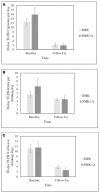A Brief Smoking Cessation Intervention for Heavy Drinking Smokers: Treatment Feasibility and Acceptability
- PMID: 30147661
- PMCID: PMC6095957
- DOI: 10.3389/fpsyt.2018.00362
A Brief Smoking Cessation Intervention for Heavy Drinking Smokers: Treatment Feasibility and Acceptability
Abstract
Approximately 20-25% of regular smokers report heavy drinking. Abstinent smokers are five times as likely to experience a smoking lapse during drinking episodes. Current efforts seek to improve treatments for this subgroup of heavy-drinking smokers. This study tested the feasibility and acceptability of addressing alcohol use in a brief, single session smoking cessation intervention (SMK+A) compared to smoking cessation counseling only (SMK); these interventions were grounded in a motivational interview framework and included personalized feedback, decisional balance, quit day setting, and tailored skills building (e.g., breathing techniques, coping with urges, dealing with social pressures) to maintain abstinence. Descriptive outcomes included reported helpfulness of intervention skills, readiness to change scores, and feasibility of participant recruitment and retention. We also assessed 7-day point prevalence of smoking cessation, and smoking and drinking reduction at 1-month follow-up. Participants (N = 22) were community-based treatment-seeking daily smokers (≥5 cigarettes/day) who were also heavy drinkers (≥14 drinks/week for men, ≥ 7 drinks/week for women; or ≥5 drinks on one episode in past week for men, ≥4 for women). Twenty five percent of interested individuals were eligible after initial phone screen, and all randomized participants were retained through follow up. All skills demonstrated high acceptability (i.e., rated between moderately and very helpful), and a significant proportion of participants in each condition reported taking action to reduce cigarette smoking and/or alcohol use at 1-month post-quit. Three participants in each condition (27.3%) attained bioverified (CO ≤ 4 parts per million and cotinine ≤ 3 ng/mL) smoking quit at follow-up. Given the modified intervention's acceptability and flexibility, larger studies may help to elucidate this intervention's effects on readiness to change, smoking cessation, and alcohol reduction.
Keywords: alcohol reduction; brief behavioral counseling; heavy drinking smokers; motivational interviewing; smoking cessation.
Figures
References
Grants and funding
LinkOut - more resources
Full Text Sources
Other Literature Sources
Miscellaneous



